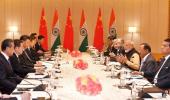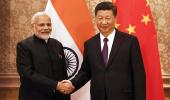'The leadership is confronted with an economy growing at its slowest pace in 20 years,' points out Claude Smadja.

The celebration of the 70th anniversary of the People's Republic of China was meant to mark the achievements of the Communist party in ensuring the 'great rejuvenation' of China and its return to a role and position 'close to the centre of the global stage'.
It was also planned to illustrate President Xi Jinping's role as the undisputed leader and, even more, as the lingxiu, a word used only for highly revered leaders, and until now reserved for Mao.
However, as fate would have it, this 70th anniversary is taking place in a context particularly difficult for China.
At home the leadership is confronted with an economy growing at its slowest pace in 20 years, partly due to the impact of the trade war initiated by the US but more importantly because of the need to fight the financial risk created by shadow banking, which went out of control in the last few years, and structural issues such as the trend of diminishing returns on investment in many State-owned enterprises, the private sector not being able to play its full role as a booster of activity because it is cash-starved, and the worrying trend of rising unemployment among the young graduates.
Add to that the pig crisis. An epidemic of swine fever has forced the culling of millions of pigs, multiplying by three the price of this crucial staple for Chinese households.
The government is desperately increasing imports and tapping into reserves to fend off popular discontent.
At the same time, the Hong Kong demonstrations, now in their 14th week and becoming increasingly violent, represent the gravest and most spectacular challenge to the authority of the Communist Party since the events of June 1989.
As the unrest escalates, the leadership finds itself confronted with a lose-lose situation.
It cannot be seen as capitulating to the protesters's demands, as the political nature of these demands is a direct challenge to the authority of the government; at the same time, violent repression, using the anti-riot units of the People’s Liberation Army stationed in Hong Kong would create an international crisis that China would truly want to avoid in the present economic and geopolitical situation.
On the international front too, the clouds have kept gathering.
There is, of course, the confrontation with the US which, beyond the trade issues, is a contest for technological and strategic prominence.
Although many indications point to the fact that Beijing might be able to sustain a trade war with Washington better than its opponent, this war is nevertheless taking its toll on the Chinese economy.
In addition to that, the shift of attitude towards the rise of China, not only in the US but also in Europe is a serious concern for Beijing, making the country's technology catch-up process more arduous.
Last but not least, the Belt and Road project, a strategic signature initiative of Xi Jinping, has now hit serious bumps with a backlash from many recipient countries against over-priced projects generating a very heavy debt load that might prove to be unsustainable, and increasing suspicion about Beijing's ultimate strategic motives.
After having highlighted the Belt and Road and the 'Made in China 2025' initiatives so much as hallmarks of the Xi Jinping era, the official propaganda is now quite silent about them, and government officials are wary to mention them.
Does that mean that China has renounced the ambitions to create its own sphere of economic and geopolitical influence through the Belt and Road initiative or its objective of achieving a prominent position in the new technologies defining the 21st century economy? Definitely not.
On the contrary, the clampdown on technology exchanges and transfer to China implemented from the US will end up accelerating Beijing's drive towards technological self-sufficiency.
And Xi will not renounce achieving the grand design of the Belt and Road Initiative.
But this is a time for a pause or recalibration for the leadership, as it grapples with the three immediate challenges of sustaining economic growth at a socially and politically acceptable level, of dealing with the Trump administration and of Hong Kong.
The recent military parade, slated to be the most impressive parade ever in China which showcased some new advanced weaponry for the first time, aimed at sending two very strong messages: To the international audience, and especially the US, that China is now a major military power not to be trampled with and that Mr Trump's bullying will not work.
It reminded Asian neighbours the mighty power they have next door if ever they had to choose between Beijing and Washington on issues such as Taiwan or the South China Sea.
For the domestic audience, all the fanfare around the 70th anniversary is meant to illustrate how, under the leadership of the Communist party, China is now a powerful player in the world.
This will feed national pride and highlight not only the remarkable achievements of the last 40 years but also the international stature that Xi's assertiveness has gained for the country.
That political control has never been so tight since the peak of the Mao era and that the regime has elevated security precautions to an almost paranoid level does not mean that the leadership feels any immediate threat to its grip on power or that there is any challenge to Xi's authority.
Every challenging phase in China's modern history has translated into tighter control.
What we have is rather a regime leaving nothing to chance and using an iconic anniversary date to show, inside and outside China, that it will not be daunted by the domestic or international headwinds that have come its way.
Claude Smadja is president of Smadja & Smadja, a strategic advisory firm.












 © 2025
© 2025